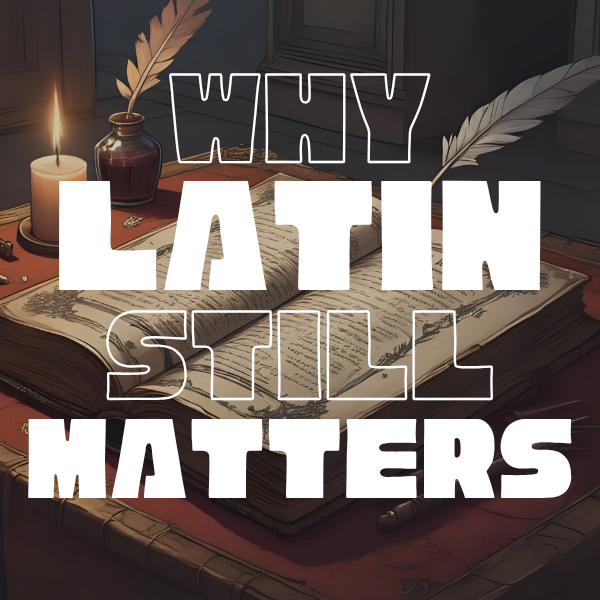Why Latin Still Matters

At Smith Preparatory Academy, we are committed to forming students who love what is true, good, and beautiful. We want them to be prepared to serve the world as thoughtful, virtuous Christians with a desire to advance God's kingdom. One of the more distinctive aspects of our curriculum, and often the most questioned, is the study of Latin.
Why Latin? It’s a fair question in an age driven by practicality and immediate results. Latin, after all, isn’t spoken at the grocery store or used in daily conversation. But the value of Latin doesn’t lie in its marketability—it lies in its power to shape the mind, enrich the soul, and cultivate cultural literacy within a tradition that Christians have inherited and are called to steward.
Latin forms the intellect. As an inflected language, it requires close attention, careful analysis, and logical thinking—skills that are foundational not only to academic success, but to wisdom itself. Studying Latin teaches students to think slowly and carefully, to look beneath the surface, and to develop habits of clarity and precision.
Latin also connects us to the great tradition. It was the language of the Church, the classroom, and the courts for centuries. The writings of Augustine, Aquinas, and so many others were shaped by it. To engage with this heritage through the original language is to gain not just knowledge, but insight and communion with those who have come before us. It is one way we “honor our fathers and mothers,” as the fifth commandment instructs.
With this in mind, we see Latin not as a hurdle, but as a gift—a way of recovering our place within the story of Western civilization and the Church. It deepens students’ understanding of language (including their own), strengthens their ability to read and reason, and equips them for faithful service in the world.
And while we do not study Latin because it is “useful,” it turns out that it is. It helps students master English, understand the grammar of other languages, and even prepare for Christian ministry. But those are byproducts. The deeper aim is formation.
Latin at Smith Prep is not about elitism or nostalgia. It is about shaping souls—training young men and women to see, to think, and to love in light of the truth. In this way, Latin becomes not a relic of the past, but a vital instrument for renewing culture and advancing the kingdom of God.
Soli Deo gloria
Liturgy: Helping Us Rightly Order Our Loves

One of the many gifts of belonging to a classical Christian school is being a part of a sweet Christian community. It is a group of kindred souls who love Jesus and want to advance God’s Kingdom. At Smith Preparatory Academy, our school is also a community steeped in daily liturgies. The liturgies we practice at school offer us a continuation of the liturgies we participate in on each Lord’s Day as we worship in our local congregations. This is unique and essential to our calling as a Classical Christian school. These liturgies are important because they help us rightly order our loves in this world. As St. Augustine writes in the City of God, “Living a just and holy life requires one to be capable of an objective and impartial evaluation of things: to love things, that is to say, in the right order, so that you do not love what is not to be loved, or fail to love what is to be loved or have a greater love for what should be loved less, or an equal love for things that should be loved less or more, or a lesser or greater love for things that should be loved equally.” Our school liturgies point us toward rightly ordering our loves.
We desperately need help with this as sinners in a fallen world. Each morning, we gather in chapel to hear the Word read, and we thank God for it, just like in Sunday worship services. We recite what we believe in the Apostles' Creed, to remind ourselves daily of the truths that the Bible tells us we so easily forget. We memorize and take to heart beautiful corporate school prayers. Then we recite them and raise up our voices in unison to ask for God’s help in learning and sanctification. We listen to sermons and engage in conversations about pursuing virtue. We discuss the cardinal virtues: prudence, justice, fortitude, and temperance, as well as the theological virtues of faith, hope, and love. We learn and sing hymns together, partaking with all those saints who have gone before us in singing these same songs of the church that have been sung for centuries. We read the Bible aloud in classrooms and discuss its truths. We pray for one another and thank God at each snack time and lunchtime. We memorize catechism questions and memorize Bible verses to hide God’s word in our hearts so it is always there when we need it. We talk throughout our days about loving our neighbors, serving others, and doing our best for God. We talk about not complaining and working hard. We talk about honesty and justice. We talk about forgiveness and learn how to forgive others. We practice using kind words and showing honor to those in authority over us. We learn to show compassion and kindness. We talk about our magnificent Creator, Lord, Shepherd, Savior, and Father. We end our days together, as a whole school, in worship to pray that we would remember our lessons and to offer a doxology of praise. These things are good and right so to do!
It is an environment that encourages rightly ordered loves–where our love of God is first followed by our love of our neighbor. It is where we work out many aspects of our sanctification as we grow in grace. It is where the rubber meets the road, as the expression goes. A place where daily, our sins and struggles, are out in full view. A place where we come as we are day in and day out as we face the hardships of this life. A place where we cry together, laugh together and pray together. It is a precious gift. It is a place where we remind each other of God’s truth and hide His word in our hearts. It is a place where we learn to share and practice putting others first. It is a place where we confess our sins and offer forgiveness to others. It is a place where we study the Bible and understand that it is truly life-giving. It is a place where we freely talk about our Lord and Savior Jesus Christ and how He has changed everything. Thanks be to God!
